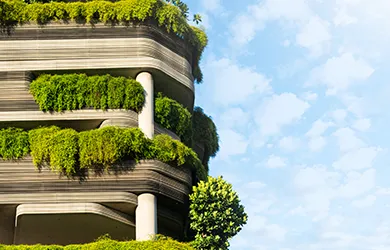- Our Story
- Our Impact
-
Our Projects
Residential
Commercial
- Careers
Lodha tops the charts in global sustainability benchmarks
By Lodha
December 12, 2024
In the face of rapid urbanisation and escalating environmental challenges, the real estate sector in India stands at the forefront of sustainable development. Transitioning to net-zero is not merely a strategic choice but an imperative for the real estate industry, particularly as we strive to drive sustainable economic development and resilience in one of the fastest-growing economies in the world.
As India’s leading real estate developer, Lodha is uniquely positioned to influence the market through a commitment to adopting net-zero practices. This commitment not only aligns with global climate goals, but also addresses the commitment to offer consumers greener, healthier, and more efficient living spaces.
Recognition from international environmental organisations and societies
Bearing testimony to Lodha’s efforts is the fact that the organisation has topped the charts in various global sustainability benchmarks.
1. GRESB
GRESB, or Global Real Estate Sustainability Benchmark, is an organisation that provides sustainability benchmarks and ESG (environmental, social, and governance) assessments for real estate and infrastructure. They are globally recognised and driven by investors. Lodha currently stands -
• 1st in Asia with a score of 100/100 in the Residential Development Benchmark category
• 1st in India and 5th in Asia with a score of 94/100 in the Standing Investments category
2. S&P Global 2024 Corporate Sustainability
The S&P Global ESG Score is a relative score measuring a company's performance on and management of ESG risks, opportunities, and impacts compared to their peers within the same industry classification.
According to their benchmark and as of 22nd November 2024, Lodha’s score stands 1st in India, and 6th highest globally, out of ~500 Global Real Estate Development companies.
3. Urban Benchmark published by the World Benchmarking Alliance
The World Benchmarking Alliance is a non-profit organisation that assesses and ranks the world’s most influential companies on their contribution to the Sustainable Development Goals. They’ve certified that Lodha stands 3rd among 300 companies and 1st among 84 in the real estate industry globally.
Leading the charge towards Net Zero in India's Real Estate sector
We are spearheading the industry’s transition to a low-carbon future, ensuring long-term viability and leadership, through our ambitious science-based targets and our flagship decarbonisation initiative, Lodha Net Zero Urban Accelerator, whose goal is to maximize the building sector's contribution to India's 2070 net-zero emissions target. It focuses on enhancing resilience, health, affordability, and access to energy services for all through actionable initiatives in five key areas: Embodied Carbon, Passive Design Solutions, Efficient Equipment, Clean Energy, and Clean Mobility.
Goals that are measured and validated
Lodha is the first Indian real estate company to have its long-term net-zero targets validated by the Science-Based Targets initiative (SBTi). To further elaborate, a company’s carbon footprint encompasses the total greenhouse gas emissions resulting from operations, products, and supply chain. According to the GHG Protocol, these emissions are classified into three scopes:
Scope 1 Emissions: Direct emissions from assets we own, including fuel consumption in equipment and vehicles, and the use of refrigerants. Scope 2 emissions: Indirect emissions from electricity consumption at our construction sites and owned assets. Scope 3 emissions: Indirect emissions that occur throughout our value chain, divided into upstream and downstream emissions, organized across fifteen categories.
Lodha’s transition to renewable sources across operations has enabled the company to already become carbon neutral in its operations under Scope 1 & Scope 2, as of March 2024.
Lodha’s Blueprint for Industry Transformation
Lodha's overarching sustainability strategy rests on two fundamental pillars: decarbonisation and resilience. While we actively pursue measures to reduce our footprint and transition towards net-zero, we also prioritise making our developments resilient to the future climate risks.
In a period marked by the real estate industry’s pivotal role in advancing towards a low-carbon future globally, we stand at the forefront of this transition. Our vision is not just to construct buildings; it is to showcase that growth can be decoupled from emissions, setting a new paradigm for sustainable urban development.
You may also like



 Enquire
Enquire
 Call
Call
 chat
chat
 Search
Search




